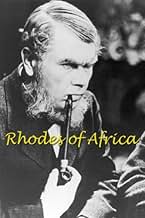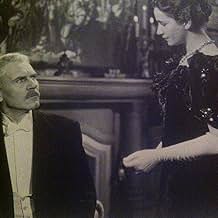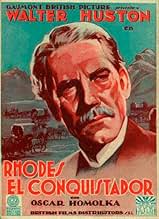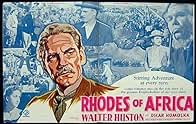This rousing adventure film tells the true story of Cecil Rhodes, a diamond miner who helped found the South African colonies.This rousing adventure film tells the true story of Cecil Rhodes, a diamond miner who helped found the South African colonies.This rousing adventure film tells the true story of Cecil Rhodes, a diamond miner who helped found the South African colonies.
- Awards
- 2 wins total
Ndanisa Kumalo
- King Lobengula
- (as Ndanisa Kumalo of Matabeleland)
Felix Aylmer
- Johannesburg Diplomat
- (uncredited)
Diana de Vaux
- Sara
- (uncredited)
Victor Fairley
- Official Announcing 'Diamond Rush'
- (uncredited)
Ernest Jay
- Minor Role
- (uncredited)
Allan Jeayes
- Kruger's Minister
- (uncredited)
Sam Livesey
- Johannesburg Diplomat
- (uncredited)
Glennis Lorimer
- Cartwright's Fiancee
- (uncredited)
Featured reviews
CECIL RHODES played by Walter Houston in RHODES OF Africa (1936) is another of those odes too Empire. Most of these have to do with 'The British Empire' which "the Sun never sets on" and that includes this film. These films were very popular prior to World War II and every studio participated in making them. Though curious casting of a American actor for a then British hero. No doubt to give box office clout in the U.S.A. for this British made film.
Made at 'Shepherds Bush' the film purports to show CECIL RHODES career from his taking over of the diamond business, through empire building and too his death. His main opponent as shown is 'OHM' PAUL KRUGER played by Oskar Homolka, President of the South African Republic. Reading their histories neither would be too modern eyes likable or enlighten characters. Though in their era they had many admirers and wide spread popularity. It is best to read their histories then to depend upon this film for a informative view.
As 'Empire Films' go this a minor league entry. For a British film it has none of drive and spectacle that can be found in the films of Alexander KORDA. Movies like THE DRUM (1938) or THE FOUR FEATHERS (1939) are a far better watch. From the U.S.A. you should view Paramounts THE LIVES OF A BENGAL LANCER (1935), Warner Brothers THE CHARGE OF THE LIGHT BRIGADE (1936) or RKO's GUNGA DIN (1939). Even the minor league entry by Universal THE SUN NEVER SETS (1939) gives you better viewing value. The caveat is view these films for entertainment, for History go elsewhere.
Made at 'Shepherds Bush' the film purports to show CECIL RHODES career from his taking over of the diamond business, through empire building and too his death. His main opponent as shown is 'OHM' PAUL KRUGER played by Oskar Homolka, President of the South African Republic. Reading their histories neither would be too modern eyes likable or enlighten characters. Though in their era they had many admirers and wide spread popularity. It is best to read their histories then to depend upon this film for a informative view.
As 'Empire Films' go this a minor league entry. For a British film it has none of drive and spectacle that can be found in the films of Alexander KORDA. Movies like THE DRUM (1938) or THE FOUR FEATHERS (1939) are a far better watch. From the U.S.A. you should view Paramounts THE LIVES OF A BENGAL LANCER (1935), Warner Brothers THE CHARGE OF THE LIGHT BRIGADE (1936) or RKO's GUNGA DIN (1939). Even the minor league entry by Universal THE SUN NEVER SETS (1939) gives you better viewing value. The caveat is view these films for entertainment, for History go elsewhere.
Cecil Rhodes is NOT an easy guy to like here in the 21st century. While back in his day he was hailed as a hero, he was also the guy who started De Beers (the diamond monopoly) and was the poster boy for colonialism--having been the leader of Cape Colony (South Africa) and having started Rhodesia (now Zimbabwe)--two of the more racist nations at the time. He also had a huge part in orchestrating the bloody Boer War at the turn of the 19th century. So, it's not surprising that we don't see more biographies of the man--pro-colonialism films died out a long time ago.
This 1936 film is not especially good. First, it is dry as dust and often looks more like a documentary instead of a feature film--a very DRY documentary. Second, how good could such a biography be when they cast the VERY American Walter Huston in the lead?! Sure, he was a very fine actor...and totally wrong as the British Rhodes. Third, while the film SHOULD have been beautiful an expansive, it's obvious that the film was made in a studio--not the lovely South African countryside. And, the film lacks music that might have made the whole thing look and SOUND grand. Instead, it was just flat and dull.
By the way, Rhodes was, perhaps, the strongest supporter of colonialism in history and hoped to one day have Britain take control of Africa, the Middle East and even return the United States to its colonial empire! Now I would have loved to have heard this in the film!
This 1936 film is not especially good. First, it is dry as dust and often looks more like a documentary instead of a feature film--a very DRY documentary. Second, how good could such a biography be when they cast the VERY American Walter Huston in the lead?! Sure, he was a very fine actor...and totally wrong as the British Rhodes. Third, while the film SHOULD have been beautiful an expansive, it's obvious that the film was made in a studio--not the lovely South African countryside. And, the film lacks music that might have made the whole thing look and SOUND grand. Instead, it was just flat and dull.
By the way, Rhodes was, perhaps, the strongest supporter of colonialism in history and hoped to one day have Britain take control of Africa, the Middle East and even return the United States to its colonial empire! Now I would have loved to have heard this in the film!
Cecil Rhodes was a terrible person who exploited Africa. Anyone with enough time should read up on his life. He double-crossed friends and foe alike. Many of these old films were like so much propaganda films for the white man mentality of stealing and swindling to get rich while making the person look like some kind of hero. I guess you could make a film about Hitler or Saddam Hussein in a favourable light also.Cecil Rhodes thought Africa should belong to White men. He believed it was the white man's destiny to rule the world.Actually most movies of this age and most now don't reflect reality. Just what the people want to believe. Watch any movie you see with a grain of salt.
Anyone interested in the British film industry of the 1930s in general and this film specifically should read "The Unknown 1930s" edited by Jeffrey Richards and published by I.B.Tauris in 1998.In particular read Chapter 10 commencing on P201 entitled "Berthold Viertel At Gaumont British".Pages 212-215 give detail about the making of this film.It is rather funny in view of the parts that he played that just before filming was about to begin it was realised that Arliss did not resemble Rhodes.The part went to Walter Huston a friend of Mark Ostrer who was one of the major shareholders in Gaumont British.Oscar Homolka was cast because he had worked with Viertel before and shared the same agent.It is ironic that i am the first person from the UK to review this film,since it is unseen and forgotten here.The other reviewers seem to think that this is a Boys Own Adventure in the same vein as "The Drum" or "Gunga Din" which it is not.It is a biography.In fact the only set action piece is truncated half way through.It is an attempt to tell the story of the statesman Rhodes and at the same time extol the virtues of the Empire.it fails on both counts.It suffers the usual problems of such films of having too little time to tell too big a story.One dissolve covers a period of 10years.Rhodes was an aggressive colonist and treated the natives as children as is admitted by the film.Looking at the film in the 1930s these were perfectly acceptable sentiments.Today we can but wonder whether the ills of the continent were to an extent the responsibility of Rhodes.This film was part of a programme designed to woo American audiences.However in June 1937 the company announced that they had lost £98000 the previous year,a colossal amount,production was topped immediately and Lime Grove studios were shut down.This left Gainsborough to turn out Will Hay and Crazy Gang comedies.Balcon went to Ealing Studios via MGM Borehamwood and the rest is history.
A remarkable film with remarkable performances by Huston infusing the character of Rhodes with a suggestion of madness, by Oscar Homolka as Kruger, a rare opportunity to see a fairly young Peggy Ashcroft and most of all the performance by Ndaniso Kumala as Lobengula. A remarkable man, a remarkable face, remarkable expressiveness. There's nothing else like this performance anywhere in movies. I was unable to find anything about him on line.
The location scenes, evidently shot in Rhodesia are stunning. One can only imagine what they would have been like in color.
The politics of the movie...don't pay too much attention. Rhodes was a complex character and according to present day morality a bad lot: a racist; and imperialist. But who he actually was, should have nothing whatever to do with the enjoyment of this unique and remarkable movie.
The location scenes, evidently shot in Rhodesia are stunning. One can only imagine what they would have been like in color.
The politics of the movie...don't pay too much attention. Rhodes was a complex character and according to present day morality a bad lot: a racist; and imperialist. But who he actually was, should have nothing whatever to do with the enjoyment of this unique and remarkable movie.
Did you know
- TriviaFinal film directed by Berthold Viertel.
- ConnectionsReferenced in Humour and Horror: Jonathan Rigby on Oscar Homolka (2024)
- SoundtracksCome Down and Open the Door
(uncredited)
Written by Slade Murray and A. Sutherd
Details
- Runtime
- 1h 30m(90 min)
- Color
- Sound mix
- Aspect ratio
- 1.37 : 1
Contribute to this page
Suggest an edit or add missing content

























